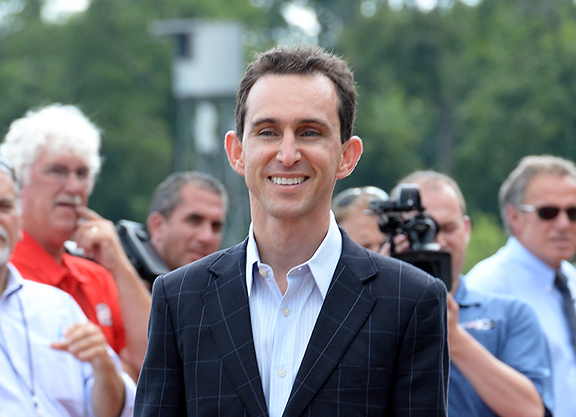By Bill Finley
Ramon Dominguez has not ridden since suffering a head injury in a 2013 spill, but he never did step away from the sport. The Hall of Fame jockey now devotes much of his time to his role as the president of the New York Race Track Chaplaincy of America, a job he took on last month. The work of the racetrack chaplains is always important but never more so than now, as the coronavirus has upended life on the racetrack for many, particularly backstretch workers.
The job has thrust Dominguez back into the spotlight as he has done public service announcements for the New York chaplains group, been all over social media and is featured in a press release asking people to make donations. It's about giving back.
“The backstretch families, I don't see them as separate from me,” he said. “I am part of that community. Even though I don't live on the backstretch, they are like family. So their needs are very important for me to help in any way I can. I feel like we have this responsibility on our hands to help them, because in some ways it is a community within the community. At the same time, they can be somewhat isolated from the real world. They get up very, very early in the morning, take care of these horses and maybe go and take a short break to come back at the end of the day. They are doing this to provide for their families, but also to support the sport in such a big way.”
Dominguez is among those spearheading an effort to bolster the food pantry on the Belmont backstretch that so many backstretch workers depend upon. People are being asked to either make an online donation or to drop off food at locations near the track. With racing having shut down in New York, there could soon be a dire need for food and supplies for the workers.
“They are, without a question, the backbone of our sport,” he said of the backstretch workers. “In times like this, more than ever, we need to come together to see how we can help. When it comes to food, that is our primary basic need. Most of us have access to it and can go to a grocery store. Sometimes these people don't have a car. So we are happy to come together, and when I say we, I mean the whole racing community. The response at this time, when there has been this call to fill these food pantries, has been overwhelming. A lot of people within the sport and outside the sport have been making donations. So that is so great to see.”
In the face of the fears and the uncertainty COVID-19 is causing, Dominguez is trying to stay optimistic.
“Like most people, I am confused,” he said. “At the same time, I'm hopeful. This is something that has taken me from one end of the spectrum to the other in terms of understanding what's happening with the coronavirus. I am trying to give my opinion so far as what is true and what's not. Still, today, despite all the information that is out there, I'm sort of trying to wrap my head around it and trying to get informed, I continue to proceed with caution and am trying to do things correctly so that we can minimize a spread of this virus.”
Dominguez lives in Saratoga Springs and stays in touch with the sport as best he can. He had to end his career when he was just 37 and had established himself as the top jockey in the country. He admits it was hard at first, but says he's come to grips with his situation.
“I honestly missed it quite a bit in the beginning,” he said. “It's something that becomes a way of life. It's not just racing itself, it's the people. The jockeys, they are like my brothers and my second family. After I couldn't ride, I started focusing on other things in life, like spending more time with my family. That's important. That's something where my time was limited given how much I was riding. I'm still, as I said before, involved in racing. While there is racing here in Saratoga, I go to the track quite often. So it is not something that I miss terribly because I am still very much connected with the sport and I do enjoy watching races and sort of putting myself in the boots of the jockeys to see what I would have done in this situation or that situation. So, although I'm not on top of the horse anymore, I feel like I'm still connected with the sport in many other ways.”
In addition to his work with the Race Track Chaplaincy of America, he invented and sells a riding crop that has a padded popper and, many jockeys say, does not hurt the horses. The priority now, though, has become the grooms, hot walkers, exercise riders and others who make up the backstretch community in New York. They need someone's help and Dominguez is happy to answer the call.
Not a subscriber? Click here to sign up for the daily PDF or alerts.






